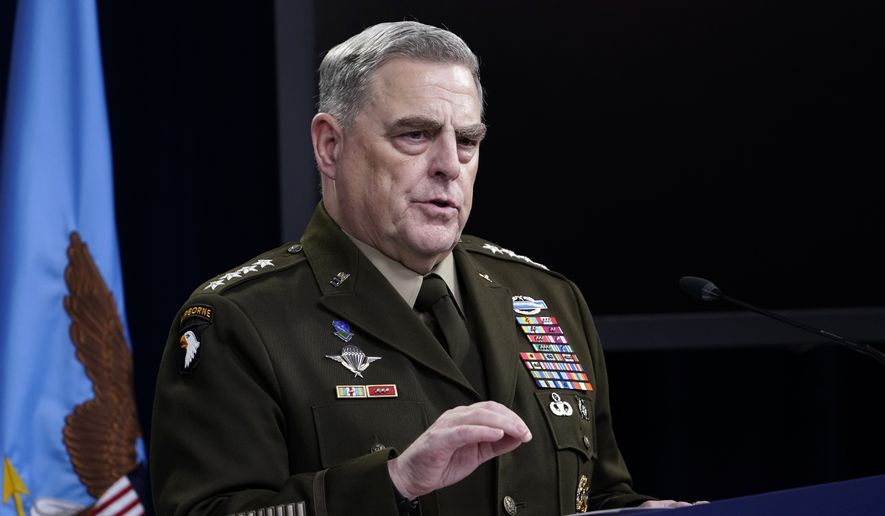The Taliban may hold sway over large swaths of Afghanistan as the withdrawal of U.S. and allied forces picks up pace, but America’s top military officer said Thursday skeptics are seriously underestimating the ability of the forces of the U.S.-backed government in Kabul to put up a fight.
Joint Chiefs of Staff Chairman Army Gen. Mark Milley acknowledged that some are predicting a rapid collapse of Afghan President Ashraf Ghani’s government once the final foreign soldiers have left this fall, but insisted a victory by the radical Islamist insurgency is not guaranteed.
“None of that is preordained. None of it is absolutely inevitable,” Gen. Milley told Pentagon reporters Thursday at a briefing alongside Secretary of Defense Lloyd Austin. The Afghan National Security Forces (ANSF) “is a significantly-sized military and police force. The government under President Ghani is still a cohesive organization.”
“That’s my personal opinion but I think it’s based on some pretty good knowledge about what’s going right now,” Gen. Milley added.
Over some senior commanders’ wishes, President Biden last month confirmed that U.S. forces, which have been fighting in Afghanistan since the weeks after the 9/11 attacks, will be gone by October 1, regardless of the conditions on the ground as they depart. Power-sharing talks between Kabul and Taliban leaders have produced little evident progress.
As an Army colonel during one of his earlier tours of duty, Gen. Milley helped set up the first battalion of Afghan soldiers there. The ANSF currently has about 300,000 troops, and Gen. Milley said the Pentagon still plans to offer training to Afghan forces after the departure is complete.
“They have been operating principally providing much of the support on their own in recent months,” Mr. Austin said. “We all want to see the Afghans succeed. Once our role changes here a bit, we’ll continue to provide support.”
Gen. Milley said U.S. leaders in Afghanistan are aware of how many ANSF soldiers have been killed and wounded in American’s longest war along with their rate of deserters.
“We know that the Taliban has suffered significant attrition rates as well,” he said, adding the insurgents have faced a problem of deserters just as the government forces have.
The U.S. is sending about more than a dozen additional warplanes, including B-52 bombers and F-18 attack fighter jets, to protect the U.S. and coalition troops as they leave. Mr. Austin, a former Army general himself, has also extended the stay of the USS Dwight D. Eisenhower aircraft carrier in the region.
Army Gen. Austin “Scott” Miller, who heads the U.S.-led coalition in Afghanistan, has “adequate” resources to protect his troops during the withdrawal process, the defense secretary said.
“He will make the call on the ground about what he needs to do and when he needs to do it,” he said.
In addition to claiming more territory outside the country’s major cities, the Taliban has launched a sustained level of attacks over the past year against ANSF personnel, from 80 to 120 incidents every day. On Thursday, unknown assailants shot and killed a former Afghan TV newsman in the southern city of Kandahar, a provincial official said, an attack that cam shortly after the Taliban complained about “one-sided” coverage in the Afghan media.
The U.S. has handed one of its bases over to the Afghan forces and shipped out enough military hardware to fill 60 Air Force C-17 Globemaster cargo aircraft. More than 1,300 pieces of equipment have been handed over to the ANSF or shipped to the Defense Logistics Agency for destruction.
Despite their shaky reputation, Afghan government troops have been taking the lead role in the battle against the Taliban for several years now, Gen. Milley said.
“It’s their country,” he said. “We’ve been supporting them, for sure, but they’ve been leading the fight.”
While U.S. personnel are leaving Afghanistan, the Pentagon will maintain the capability to launch counter terrorism missions in Afghanistan from undisclosed locations “over the horizon.”
U.S. support to Afghanistan after the drawdown will be run out of the American embassy in Kabul. In addition to providing financial backing to the Afghan government and security forces, Pentagon officials said they will continue to offer maintenance and logistics support to the ANSF from outside the country.
Afghanistan’s ultimate outcome won’t be known until long after the last American soldier has left the country, Gen. Milley said.
“There are a lot of possible outcomes here.”
• Mike Glenn can be reached at mglenn@washingtontimes.com.




Please read our comment policy before commenting.